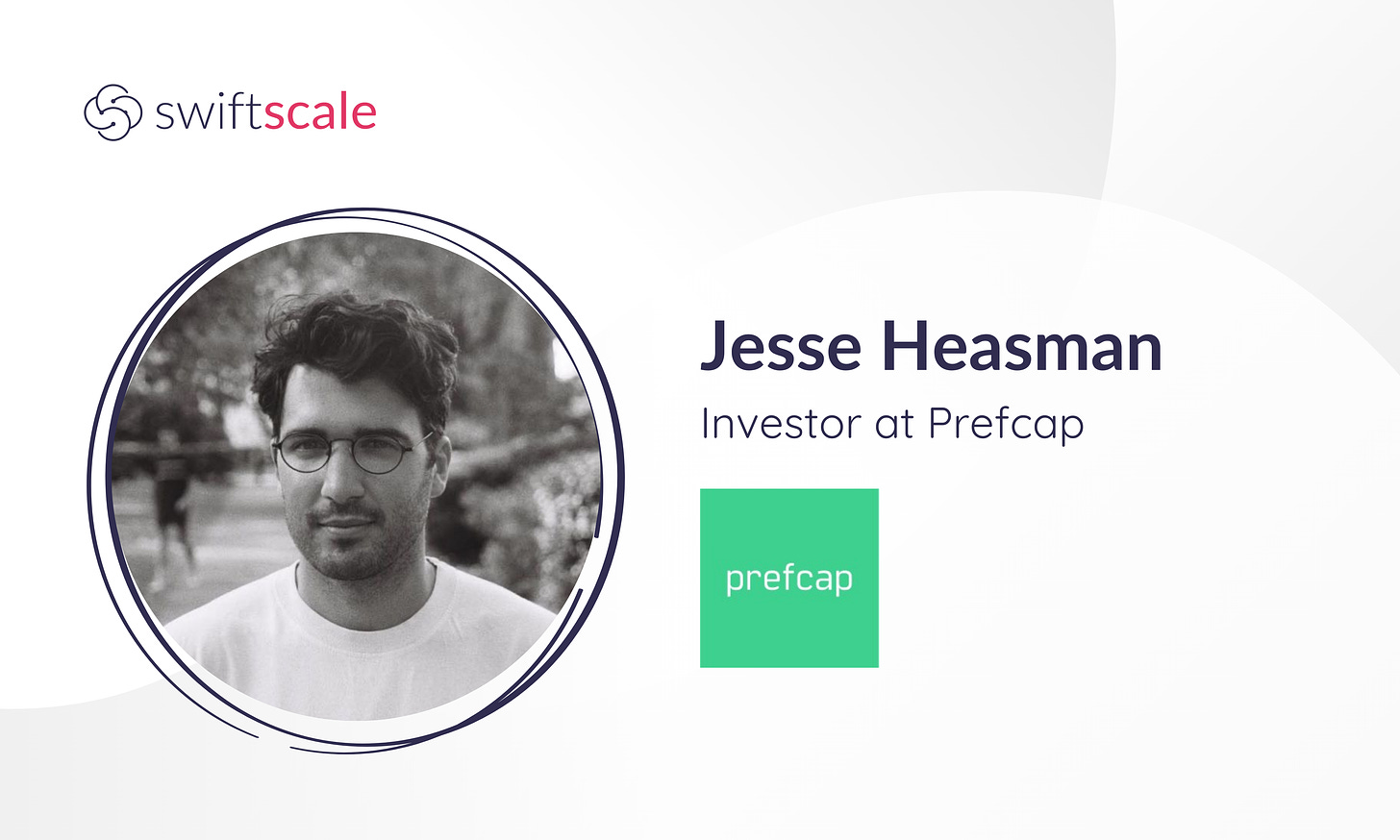Prefcap VC on bridging the gap to Series A
We sit down with Jesse Heasman, an Investor at Prefcap, an enterprise software-focused fund, to discuss the digitisation of archaic industries and his plans to shake up fundraising news.
Four years ago, Jesse Heasman left consulting for the VC world. After a stint at Accenture, working on various projects for leading banks (and learning how to make pretty PowerPoints), Jesse found himself on the front row of the UK’s neobank revolution. Inspired by innovation and having firmly caught the startup bug, Jesse decamped to Prefcap, a London-based early-stage VC fund, where he now focuses on fintech and enterprise software.
We caught up with Jesse over a quick Zoom to discuss the startup trends he’s excited about, why London is still a hotbed for fintech, and why he’s taken it upon himself to launch Soapbox, a platform for UK venture funding news.
About Prefcap
Prefcap fund at a glance:
Fund Size: $50M
Focus: Early-stage enterprise software startups
Stage: Seed to Series A
Check Size: $500K - $2M
Geography: UK and Europe
Team: Three partners and three investors who have collectively backed over 50 companies
Notable Portfolio Companies: AutomatePro, Goodtill (acquired by SumUp) and Profinda
Investment Thesis: Prefcap backs founders building innovative, category-defining companies that leverage software to disrupt traditional industries. Prefcap most commonly invests in B2B software that have traction with live clients and revenues approaching or exceeding the £500k ARR mark. They have 23 companies in their portfolio, with 3 exits.
Value Add: Prefcap offers businesses bitesize funding to help founders quickly top-up a live fundraise or act as a bridge to extend a runway to Series A or a larger round. They are passive investors and promise to invest quickly and simply to provide certainty, allowing founders to get on with the day job.
The interview
What made you interested in investing?
I started life out as a consultant at Accenture. I learnt a lot, particularly how to make pretty PowerPoint slides, and ended up in the strategy consulting arm for financial services. I worked on some really exciting projects with leading banks and fintechs looking to partner with or disrupt the incumbents. I started to support Accenture’s Fintech Innovation Lab, and that really got me excited about fintech and the startup world.
As a financial services strategy team, we were also tracking the rise of the neobank: Starling Bank, Monzo and Revolut, from the early doors when I was at Accenture and the birth of London as a hotspot for fintech has stayed with me.
Then, when an opportunity came up at Prefcap almost four years ago, I jumped at it. Since then, I have continued to focus on enterprise software, but with an interest in the fintech space.
The world's leading financial institutions are either based or often HQ'd in London, so the ability to access talent (and also buyers) for fintech solutions is unprecedented. The Prefcap portfolio brings this to life. We've got investments in insurtech, payments, wealth management, cash collection and I think it's a really vibrant space to be in. There are lots of UK success stories in this space.
What is Prefcap’s thesis?
In the UK, it's relatively easy to raise a seed round from angels with the EIS funding available. So, we see lots of businesses getting to a certain scale with some angel funding, maybe from a seed fund, but they often struggle to bridge the gap through to Series A. Increasingly, funds are looking for £2-3 million of ARR upwards before investing at that stage.
We've designed a way of investing that allows us to back companies in that gap and provide bitesize funding of £500k to £1m into those opportunities, specifically B2B or enterprise software businesses.
That looks like backing start-ups with anywhere between £500k of ARR up to £2m plus. We back exciting businesses that are caught between the VC funding stages.
In terms of how we invest, we're effectively an early-stage venture debt fund. We invest for our debt structure and then we take an equity kicker in the businesses we back. There's a bit of risk in playing in this white space and therefore we have a bit of downside protection plus some upside if it all goes well.
That allows us to back founders that are overlooked for structural reasons, and give bitesize funding, which offers them less dilution. There's less cost of doing a deal with us because of our structure and in-house due diligence approach and it means that we can play where others aren't.
Behind the thesis, what trends are you excited by?
The digitisation of archaic industries is still happening at pace and within it, there's a lot of hype around AI. Lots of industries are just getting to the point of adopting software for things they would have done previously on Excel, whiteboards, paper, emails, etcetera. We meet lots of founders operating in that space where they've seen a niche opportunity for a workflow tool or data analytics capability in a specific sector or industry.
Often the options for enterprises are either, do it yourself badly or don't do it at all - so our companies don't always have huge competition. That's the kind of stuff we get excited by and we still think there's a huge space for businesses operating those industries.
Even with the shift to AI, our view is that there'll only be a handful of large language model winners resulting in the landscape being pretty commoditised like compute is with AWS or Azure today. However, the workflow and UI software experience for certain enterprises will take subject matter or industry experts building in certain niches to understand where AI can be applied best and how it can be applied sensibly to existing business processes.
The sorts of industries that we're excited by are construction, infrastructure and government, which are still super archaic.
What are the challenges and opportunities that you're seeing in this focus area for founders and for startups?
Unless you've been lucky or extremely talented and found the perfect product-market fit early on, things always take a bit longer than expected. Whilst that's happening, particularly in the current macro environment where selling software has got a little bit harder, the Series A investors are looking to write larger checks. That's how they’ll get remunerated, by raising larger funds to generate a decent management fee and thus optimising to deploy larger tickets. It makes sense, but it does open up a bit of space where five years ago they might have looked for one million of ARR and now it might be three.
There's almost no reason why they shouldn't be backed, apart from the fact the VC fund structure is set up in such a way that now they need more traction to absorb a larger cheque.
Aside from the capital, is there anything else that you provide for startups?
We bid ourselves as a passive investor, mainly because everyone's selling themselves as value-add investors and we think they’re probably under-delivering on that promise. We tend to say we're passive. That being said, it's really important that companies receive that further funding, whether it be from an equity investor or a later-stage venture debt provider further up the stack.
We've got great relationships with VCs, VCTs and venture debt players in the UK and Europe, all of whom we're gearing up our companies to say, maybe you could raise from XYZ down the line. A big part of where we help and support is with that follow on funding and graduation rate.
What qualities or characteristics do you look for in your founder?
We really like founders who have found a problem in an industry they've worked in and have gone and built a solution for this. A decent chunk of our portfolio are in that zone. For example, Automate Pro, the founders were involved in the implementation of ServiceNow across clients before building the software they needed to do (or automate) their day jobs. Immersify Education is another recent investment we've made, which is founded by experts in delivering applied medical and dentistry training.
They took that expertise and built a solution they wanted to see in the market. That also means these types of founders might know the terminal buyer of the business already, not to mention helping with initial sales traction with their black book of industry contacts.
What advice are you regularly giving founders?
I think the advice over the last year or so has been to have it in the locker to flip to profitability if required. Most early-stage venture businesses are loss-making and will be looking to raise the next round to fund working capital. If sales traction is slower and the VC funding market continues to dry up or revert to the norm, being able to be profitable means you’ll have the ability to control your destiny.
You founded Soapbox in September this year. Why this, why now?
Since joining Prefcap, I've been following venture funding news as it happens, while also thinking about how we get out the news of our companies raising and getting eyeballs on that. What struck me is that unless you're able to get a Sifted or TechCrunch splash, a lot of the other options are relatively poor quality. I thought there was a gap here for a super simple, slick, free-to-use (and ad-light) platform for founders to share fundraising news.
Crucially for the rest of us, whether we are future investors, potential hires, or even possible clients, to have the ability to filter and read that log of tech news more easily. So, that's how it came about. What it aims to do is to make it really easy for founders that maybe aren't building in a super sexy space, maybe aren't at the scale that is going to get picked up in a TechCrunch or maybe don't have PR connections or a huge network themselves to get relevant views.
At the moment, the news is any UK VC fundraise or angel round and we're currently building the flow of that news. If you've just raised or you’re about to, drop us a line at submit@soapbox.vc!
What’s your vision for Soapbox?
The VC world is still super opaque, but there are some initiatives out there building the VC tech stack to solve this issue. Take Shipshape, who are creating a VC search engine, and Landscape building the operating system for VC, the dream is that Soapbox becomes part of this tooling. I want to contribute to the efforts to democratise the space such that anyone and everyone can get eyeballs on their funding news regardless of where they're positioned in the market.
We’re swiftscale and we matchmake founders, investors and executives and its the quality of our network that sets us apart.
Get in touch: hello@swiftscale.co






